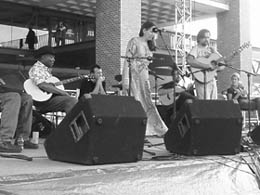Folk music literally spans the map. In all areas of the country, folk forms have developed as uniquely as speech patterns, expressing the views and needs of particular cultural groups. This phenomenon is not just national but global.
The artists who gathered on the Festival’s Plaza Stage on Saturday afternoon under the banner “Down South, Down Under, Down East” were engaged in an attempt to bridge the differences between regional folk styles, to get the dialects talking with each other.
Representing the folk traditions of the South were Blues traditionalists Cephas and Wiggins. “Down Under” offered up the gifted young Waifs, an innovative folk-rock group hailing from Australia. “Down East” gave us, for better or worse, the husband-wife duo of Susie Burke and David Surette who work within the New England, Celtic and Breton genres.
The groups began by taking turns, each presenting songs that expressed the lingo of their chosen style. The atmosphere was playfully competitive, each artist giving the best they had to offer while appreciating and even learning from each other. Cephas and Wiggins went first, and their foot-stomping brand of Blues was hard to beat.
Certainly, Burke and Surette weren’t up to the task. Though billed as traditional folk artists, they sounded more like New Age, and second-rate New Age at that. Romantic in the worst sense of the word, their maudlin, gauzy music had little to offer but wimpy guitar picking and cheesy lyrics like “I will make my heart an open door.” The effect was nearly parodic. Being a New Englander myself, I was more than slightly outraged to see this exhibition of poor taste.
Thank God the Waifs came on next to clear the air. Full of youth and energy, the Waifs have a fresh take on folk music. They aren’t afraid to bring in a little Swing, or Blues, or even Rock and Roll to breathe new life into old forms. Their sound is full of the power of natural elements; it is open, dark, and windy. The band, for all its tender age, is clearly aware of the history of folk music and has the chops to duke it out with the best of the established masters.
It helps that their lead singer, Vikki Simpson, has a voice like a fallen angel; it is powerful and sultry. And she can wail on the harmonica well enough to make the legendary Phil Wiggins take notice.
The impression seems to have been mutual; as the show went on, the Waifs and Cephas and Wiggins took to each other like newfound soul mates. With the hearty encouragement of the Bluesmen, the bands collaborated, blending their talents to make new and exciting music. The Waif’s guitarist, urged on by Cephas and Wiggins, delighted the audience with some impressive modern Blues soloing. It came as no surprise that Burke and Surette were left in the dust; they just couldn’t keep up with the spontaneous energy being created between the other artists.
The crowd was on their feet through three ovations; as far away as the main stage on the soccer field, you could hear them screaming for more. “It was electrifying,” said one witness.
It was also an example of impromptu musical solidarity that expressed what the Folk Festival is really about–bringing all the different voices of Folk together in song.

